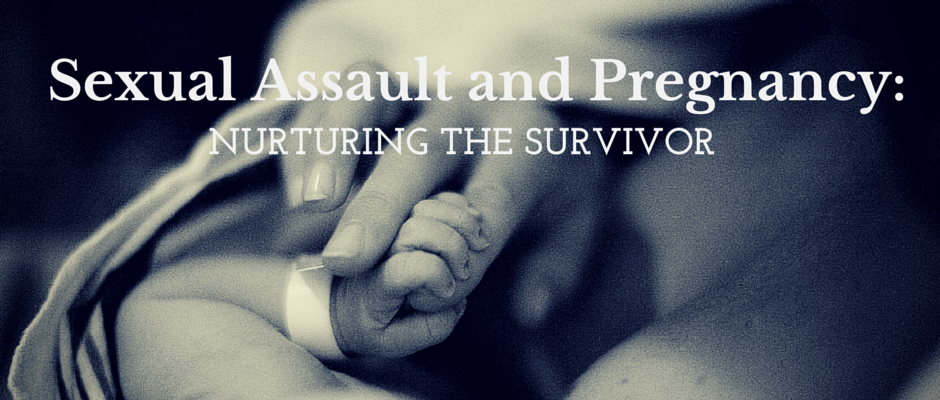Nearly one in three women is sexually assaulted in their lifetime — and the experience of pregnancy and birth can be a minefield of triggers. Here, a 30 year old woman recalls disassociating during labor and having flashbacks to a sexual assault at age 7:
“All I remember is being handed my little baby on the floor in the middle of a sea of bloody sheets and faces. I couldn’t comprehend the pain, the violence, or the brutality … I don’t even know whether in my mind the person holding that baby and taking in the bloody sheets, shock and pain was a 30-year-old woman, or a 7-year -old girl” (Tatano Beck, C., p. 94).
If you or someone you love is a survivor of sexual assault, there are many avenues to navigate pregnancy and childbirth in helpful ways including: frequent re-orienting, support for the woman’s decisions, general empowerment, and maintaining calm and stability in the immediate postpartum period.
The importance of supportive and non-judgmental care cannot be overstated. In pregnancies that result from an assault, it’s important for family and care providers to consider how their words and actions can affect women. Comments such as “I just don’t know how you can do this,” while said with good intentions, can make a survivor feel ashamed.
Instead, create a space for women to talk and reflect on their feelings so that any decisions about the care and delivery process are entirely driven by the mother. It’s also important to be cognizant of triggers for the survivor, which can include:
- Pregnancy related body changes, including pain and sensitivity in the breasts and pelvic region. These areas are often traumatized during an assault, making it difficult for a survivor to separate one pain from another.
- Limited movement in the last trimester, labor, and birth.
- Interventions that require staying in bed, combined with pain of labor. These may bring up extremely difficult memories.
Developing a birth plan with the people who will be present during labor and delivery is one of the best tools to prepare for these situations. It empowers the survivor, and allows her caregivers and loved-ones to be prepared to provide the right support during a crucial time.
Breastfeeding
Many women are able to enjoy pleasant breastfeeding experiences, providing them with feelings of accomplishment as they nurture their children. However, for survivors of sexual assault, breastfeeding can trigger and source of degradation, shame or fear, especially if the breasts were a part of the abuse. These feelings of apprehension and fear can negatively affect the let down reflex and milk supply.
In these situations, open and honest communication is paramount. It’s also helpful to think about breastfeeding plans and to have a supportive dialogue before the birth. Questions to consider:
- Breastfeeding versus formula feeding: which is the best fit for the mother and her family?
- Did the mother breastfeed other children? Were there any problems with breastfeeding?
- What does the mom need to feel safe and supported with breastfeeding?
Survivors choosing to breastfeed need to initiate skin-to-skin contact and the latch at their own time and pace. Some women need more time to establish this relationship with their baby. Patience, respect, and consistent support for a mother’s choices are essential.
By holding space and providing meaningful, individualized support, family and caregivers can help survivors of sexual assault to have empowering and joyful birth and breastfeeding experiences. Providing this type of unconditional support can aid immensely in the healing process of survivors of sexual assault.
Resources
Local and national hotlines are a great resource for women who want to talk and seek support in a safe environment:
- Greater Richmond Regional Hotline for survivors and allies | (804) 612-6126
- Rape, Abuse, and Incest National Network | Hotline: (800) 656-4673
- Safe Harbor Richmond | Hotline: (804) 612-6126
 Kathleen M. Bell, RNC-OB, WHNP-BC and Candace W. Burton, Ph.D., are assistant professors in the Virginia Commonwealth University School of Nursing’s Department of Family and Community Health Nursing. Burton is also a research scientist for Intimate Partner Violence & Sexual Assault in the VCU Institute for Women’s Health.
Kathleen M. Bell, RNC-OB, WHNP-BC and Candace W. Burton, Ph.D., are assistant professors in the Virginia Commonwealth University School of Nursing’s Department of Family and Community Health Nursing. Burton is also a research scientist for Intimate Partner Violence & Sexual Assault in the VCU Institute for Women’s Health.
References:
Janies, J.P., Taft, A., Amir, L.H., & Agius, P. (2014). Does intimate partner violence impact on women’s initiation and duration of breastfeeding? Breastfeeding Review, 22, 2, 11-19.
Tatano Beck, C. (2009). An adult survivor of child sexual abuse and her breastfeeding experience: a case study. Maternal Child Nursing, 32, 2, 91-97.


This brings up such a strong topic that many people are unaware of. The trauma of a childhood sexual assault or any sexual assault has lasting effects on survivors and can impact a multitude of life experiences. While communication can be difficult, being open and supportive during these times is the best advice for loved ones. I never thought of breast feeding being a potential trigger, but it makes perfect sense and really opened my eyes.